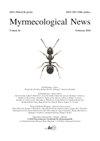求助PDF
{"title":"富蜂的诱导免疫应答(膜翅目:富蜂科)","authors":"Siiri-Anna Fuchs, L. Sundström, N. Bos, D. Stucki, D. Freitak","doi":"10.25849/MYRMECOL.NEWS_028:053","DOIUrl":null,"url":null,"abstract":"Parental immune experience can enhance offspring defence mechanisms towards prevalent pathogens in the surrounding environment. This process of inherited resistance from one generation to another is known as trans-generational immune priming (TGIP) in invertebrates. In sedentary and dense insect societies, such as ant colonies, TGIP can influence colony survival and fitness upon pathogen outbreaks. However, TGIP appears to depend on species and environmental stressors and therefore can vary in intensity, as well as in the molecular mechanisms leading to resistance. Here, we stimulated the immune system of queens of the ant Formica fusca (Linnaeus, 1758) by wounding or injecting dead conidia of the entomopathogenic fungus Beauveria bassiana (Bals.-Criv.) Vuill. (1912). The offspring were subsequently infected with B. bassiana , and the effect of this priming on survival was evaluated. Furthermore, we investigated whether immune challenge of the mother queen induces changes in the expression of immunity-related genes in queens themselves and their brood. We combined this information with measurements of offspring size and number. Larvae produced by untreated queens had a significantly higher mortality after infection with B. bassiana , whereas those produced by immune-primed queens survived no worse than unexposed ones. Adult worker offspring from sham-control mothers showed a protective effect of queen treatment, consistent with transgenerational immune priming. Thus, the effects of queen priming appear to manifest themselves slightly differently in larval and adult offspring. No differences were detected in offspring number or size, but immune gene expression levels showed changes, both in queens and their offspring. Open access, licensed under CC BY 4.0. © 2018 The Author(s). Pages: 53-66 DOI: 10.25849/myrmecol.news_028:053 Volume: 28 Year: 2018 Journal: Myrmecol. New","PeriodicalId":49787,"journal":{"name":"Myrmecological News","volume":"101 1","pages":"53-66"},"PeriodicalIF":3.8000,"publicationDate":"2018-12-10","publicationTypes":"Journal Article","fieldsOfStudy":null,"isOpenAccess":false,"openAccessPdf":"","citationCount":"6","resultStr":"{\"title\":\"Induced immune responses in Formica fusca (Hymenoptera: Formicidae)\",\"authors\":\"Siiri-Anna Fuchs, L. Sundström, N. Bos, D. Stucki, D. Freitak\",\"doi\":\"10.25849/MYRMECOL.NEWS_028:053\",\"DOIUrl\":null,\"url\":null,\"abstract\":\"Parental immune experience can enhance offspring defence mechanisms towards prevalent pathogens in the surrounding environment. This process of inherited resistance from one generation to another is known as trans-generational immune priming (TGIP) in invertebrates. In sedentary and dense insect societies, such as ant colonies, TGIP can influence colony survival and fitness upon pathogen outbreaks. However, TGIP appears to depend on species and environmental stressors and therefore can vary in intensity, as well as in the molecular mechanisms leading to resistance. Here, we stimulated the immune system of queens of the ant Formica fusca (Linnaeus, 1758) by wounding or injecting dead conidia of the entomopathogenic fungus Beauveria bassiana (Bals.-Criv.) Vuill. (1912). The offspring were subsequently infected with B. bassiana , and the effect of this priming on survival was evaluated. Furthermore, we investigated whether immune challenge of the mother queen induces changes in the expression of immunity-related genes in queens themselves and their brood. We combined this information with measurements of offspring size and number. Larvae produced by untreated queens had a significantly higher mortality after infection with B. bassiana , whereas those produced by immune-primed queens survived no worse than unexposed ones. Adult worker offspring from sham-control mothers showed a protective effect of queen treatment, consistent with transgenerational immune priming. Thus, the effects of queen priming appear to manifest themselves slightly differently in larval and adult offspring. No differences were detected in offspring number or size, but immune gene expression levels showed changes, both in queens and their offspring. Open access, licensed under CC BY 4.0. © 2018 The Author(s). Pages: 53-66 DOI: 10.25849/myrmecol.news_028:053 Volume: 28 Year: 2018 Journal: Myrmecol. New\",\"PeriodicalId\":49787,\"journal\":{\"name\":\"Myrmecological News\",\"volume\":\"101 1\",\"pages\":\"53-66\"},\"PeriodicalIF\":3.8000,\"publicationDate\":\"2018-12-10\",\"publicationTypes\":\"Journal Article\",\"fieldsOfStudy\":null,\"isOpenAccess\":false,\"openAccessPdf\":\"\",\"citationCount\":\"6\",\"resultStr\":null,\"platform\":\"Semanticscholar\",\"paperid\":null,\"PeriodicalName\":\"Myrmecological News\",\"FirstCategoryId\":\"97\",\"ListUrlMain\":\"https://doi.org/10.25849/MYRMECOL.NEWS_028:053\",\"RegionNum\":1,\"RegionCategory\":\"农林科学\",\"ArticlePicture\":[],\"TitleCN\":null,\"AbstractTextCN\":null,\"PMCID\":null,\"EPubDate\":\"\",\"PubModel\":\"\",\"JCR\":\"Q1\",\"JCRName\":\"ENTOMOLOGY\",\"Score\":null,\"Total\":0}","platform":"Semanticscholar","paperid":null,"PeriodicalName":"Myrmecological News","FirstCategoryId":"97","ListUrlMain":"https://doi.org/10.25849/MYRMECOL.NEWS_028:053","RegionNum":1,"RegionCategory":"农林科学","ArticlePicture":[],"TitleCN":null,"AbstractTextCN":null,"PMCID":null,"EPubDate":"","PubModel":"","JCR":"Q1","JCRName":"ENTOMOLOGY","Score":null,"Total":0}
引用次数: 6
引用
批量引用
Induced immune responses in Formica fusca (Hymenoptera: Formicidae)
Parental immune experience can enhance offspring defence mechanisms towards prevalent pathogens in the surrounding environment. This process of inherited resistance from one generation to another is known as trans-generational immune priming (TGIP) in invertebrates. In sedentary and dense insect societies, such as ant colonies, TGIP can influence colony survival and fitness upon pathogen outbreaks. However, TGIP appears to depend on species and environmental stressors and therefore can vary in intensity, as well as in the molecular mechanisms leading to resistance. Here, we stimulated the immune system of queens of the ant Formica fusca (Linnaeus, 1758) by wounding or injecting dead conidia of the entomopathogenic fungus Beauveria bassiana (Bals.-Criv.) Vuill. (1912). The offspring were subsequently infected with B. bassiana , and the effect of this priming on survival was evaluated. Furthermore, we investigated whether immune challenge of the mother queen induces changes in the expression of immunity-related genes in queens themselves and their brood. We combined this information with measurements of offspring size and number. Larvae produced by untreated queens had a significantly higher mortality after infection with B. bassiana , whereas those produced by immune-primed queens survived no worse than unexposed ones. Adult worker offspring from sham-control mothers showed a protective effect of queen treatment, consistent with transgenerational immune priming. Thus, the effects of queen priming appear to manifest themselves slightly differently in larval and adult offspring. No differences were detected in offspring number or size, but immune gene expression levels showed changes, both in queens and their offspring. Open access, licensed under CC BY 4.0. © 2018 The Author(s). Pages: 53-66 DOI: 10.25849/myrmecol.news_028:053 Volume: 28 Year: 2018 Journal: Myrmecol. New


